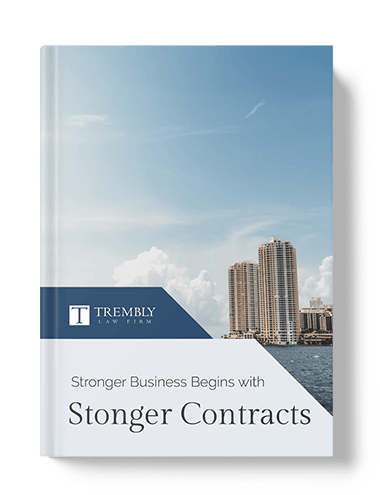The coronavirus pandemic is an unprecedented global event which will have lasting impacts on the way business is done, long after it has subsided. Let me start by assuring you that Trembly Law Firm is working hard to assist the business community. We have been pouring through mountains of misinformation being disseminated, and a plethora of inconsistent advice that is littering the internet—trying to make sense of it all for you.
We have received multiple phone calls and messages inquiring about the enforceability of contracts during this pandemic, and we’d like to take this opportunity to share some information and considerations regarding this. Practically speaking, businesses that have long-term relationships with one another should work cooperatively to avoid unnecessary disputes, mitigate losses, and ensure future working relationships. Nevertheless, it is not novel for a party to break a contract.
Here are some pointers and information we would like to share with you:
Contracts Are Still Enforceable During A Global Pandemic!
Yes, there’s a global pandemic. Yes, its magnitude is unprecedented. No, that doesn’t give everyone a free pass to break contracts. There are several factors that have to be considered when determining whether a contract is enforceable, and whether there are any defenses to nonperformance of a contract.
Is The Contract Truly Impossible To Perform?
In contract law, there is a doctrine of impossibility. It essentially states that when a contract is impossible to perform, it is no longer enforceable. Now, impossible doesn’t mean that performance of the contract turns out to be difficult or burdensome to perform—it has to truly be impossible. Whether a contract is impossible to perform depends on a detailed analysis of the facts. Furthermore, the facts making the performance impossible must have been not available or known to the parties prior to execution of the contract. For example, in the context of a business transaction closing, what do the terms of the contract say? Can the closing be done remotely? Can the funds be transferred remotely? Is it contingent on financing and is there financing still available? Is there due diligence that cannot be completed remotely? Was the pandemic foreseeable at the time of execution of the contract? On the other hand, if you are a contractor with a deadline, and the supply of materials has been delayed or completely stopped as a result of a quarantine, does that render performance impossible? As you can see, there are a number of questions that need to be answered, and it will depend largely on the type of business and the industry.
Is this an “Act of God”?
Similar to the doctrine of impossibility, there is a concept in contract law called force majeure. It refers to natural acts or acts beyond our control that prevent a contract from being completed. It is commonplace to see force majeure provisions in a contract, and it is regularly utilized as a basis for someone to claim they are not obligated under the contract. Not all force majeure clauses are the same, and the language used in the force majeure clause will determine whether the effect of COVID-19 will excuse performance. These provisions are narrowly read, and usually include a catch all provision that excuses performance for an “Act of God”. It is unlikely that most contracts include that a pandemic or communicable disease disaster constitutes a force majeure event. Thus, we anticipate that there will be a wave of litigation regarding whether the coronavirus pandemic constitutes an “Act of God”. This will all hinge on the foreseeability of a pandemic. Insurance companies have successfully argued in the past that communicable disease disasters and pandemics are foreseeable and do not constitute an unforeseeable “Act of God”. Ultimately, whether a force majeure clause will excuse a party’s performance will largely depend on the type of business, the specific language used in the force majeure clause, and/or the foreseeability of the pandemic.
Has the purpose of the contract been “frustrated”?
The doctrine of frustration of purpose means that the purpose for which the parties entered into the contract has been frustrated. This doctrine considers the underlying purpose of the contract being frustrated. For example, if an organization leases a large auditorium with the purpose of bringing together as many people as possible for an industry-related convention, does the local government’s order to disband all group gatherings in excess of 50 people frustrate the purpose of the contract? Does that excuse the organization from paying the rental fee? Is the organization entitled to return of any deposit? Is the organization subject to any liquidated damages set forth in the agreement? It’s clear that the effects from the reaction to COVID-19 will frustrate the purpose of some contracts. Whether it does depends largely on the terms of the contract and other specific factual considerations.
What should you do?
Whether you are anticipating you will have to enforce a contract or you are considering breaking a contract, you need to speak with a knowledgeable attorney at Trembly Law Firm before you take any action. Our guidance and involvement may be able to help you avoid an unnecessary and costly legal battle or put you in the best position possible to succeed in litigation. We understand the concerns of businesses and business owners during this event, and we work closely with our clients to make intelligent and informed business decisions.

















